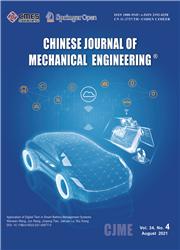Well-Dispersed Graphene Enhanced Lithium Complex Grease Toward High-Efficient Lubrication
IF 4.5
2区 工程技术
Q1 Engineering
引用次数: 0
Abstract
Abstract Graphene as a lubricating additive holds great potential for industrial lubrication. However, its poor dispersity and compatibility with base oils and grease hinder maximizing performance. Here, the influence of graphene dispersion on the thickening effect and lubrication function is considered. A well-dispersed lubricant additive was obtained via trihexyl tetradecyl phosphonium bis(2-ethylhexyl) phosphate modified graphene ([P 66614 ][DEHP]-G). Then lithium complex grease was prepared by saponification with 12-OH stearic acid, sebacic acid, and lithium hydroxide, using polyalphaolefin (PAO20) as base oil and the modified-graphene as lubricating additive, with the original graphene as a comparison. The physicochemical properties and lubrication performance of the as-prepared greases were evaluated in detail. The results show that the as-prepared greases have high dropping point and colloidal stability. Furthermore, modified-graphene lithium complex grease offered the best friction reduction and anti-wear abilities, manifesting the reduction of friction coefficient and wear volume up to 18.84% and 67.34%, respectively. With base oil overflow and afflux, well-dispersed [P 66614 ][DEHP]-G was readily adsorbed to the worn surfaces, resulting in the formation of a continuous and dense graphene deposition film. The synergy of deposited graphene-film, spilled oil, and adhesive grease greatly improves the lubrication function of grease. This research paves the way for modulating high-performance lithium complex grease to reduce the friction and wear of movable machinery.分散良好的石墨烯增强锂复合润滑脂实现高效润滑
石墨烯作为一种润滑添加剂,在工业润滑领域具有巨大的应用潜力。然而,它的分散性差,与基础油和润滑脂的相容性差,阻碍了性能的最大化。本文考虑了石墨烯分散对增稠效果和润滑功能的影响。以三己基十四烷基磷酸二(2-乙基己基)磷酸改性石墨烯([P 66614][DEHP]-G)为原料,制备了分散良好的润滑油添加剂。然后以12-OH硬脂酸、癸二酸、氢氧化锂为原料,以聚α -烯烃(PAO20)为基础油,改性后的石墨烯为润滑添加剂,皂化法制备锂复合润滑脂,并与原石墨烯进行比较。对制备的润滑脂的理化性质和润滑性能进行了详细的评价。结果表明,所制备的润滑脂具有较高的滴点和胶体稳定性。改性石墨烯锂复合润滑脂具有最佳的减摩和抗磨性能,摩擦系数和磨损体积分别降低18.84%和67.34%。随着基础油的溢出和流入,分散良好的[P 66614][DEHP]-G很容易吸附在磨损表面,形成连续致密的石墨烯沉积膜。沉积的石墨烯膜、溢出的油和粘接的润滑脂的协同作用大大提高了润滑脂的润滑功能。本研究为调制高性能锂复合润滑脂以减少活动机械的摩擦磨损铺平了道路。
本文章由计算机程序翻译,如有差异,请以英文原文为准。
求助全文
约1分钟内获得全文
求助全文
来源期刊

Chinese Journal of Mechanical Engineering
ENGINEERING, MECHANICAL-
CiteScore
5.60
自引率
4.80%
发文量
3097
审稿时长
8 months
期刊介绍:
Chinese Journal of Mechanical Engineering (CJME) was launched in 1988. It is a peer-reviewed journal under the govern of China Association for Science and Technology (CAST) and sponsored by Chinese Mechanical Engineering Society (CMES).
The publishing scopes of CJME follow with:
Mechanism and Robotics, including but not limited to
-- Innovative Mechanism Design
-- Mechanical Transmission
-- Robot Structure Design and Control
-- Applications for Robotics (e.g., Industrial Robot, Medical Robot, Service Robot…)
-- Tri-Co Robotics
Intelligent Manufacturing Technology, including but not limited to
-- Innovative Industrial Design
-- Intelligent Machining Process
-- Artificial Intelligence
-- Micro- and Nano-manufacturing
-- Material Increasing Manufacturing
-- Intelligent Monitoring Technology
-- Machine Fault Diagnostics and Prognostics
Advanced Transportation Equipment, including but not limited to
-- New Energy Vehicle Technology
-- Unmanned Vehicle
-- Advanced Rail Transportation
-- Intelligent Transport System
Ocean Engineering Equipment, including but not limited to
--Equipment for Deep-sea Exploration
-- Autonomous Underwater Vehicle
Smart Material, including but not limited to
--Special Metal Functional Materials
--Advanced Composite Materials
--Material Forming Technology.
 求助内容:
求助内容: 应助结果提醒方式:
应助结果提醒方式:


